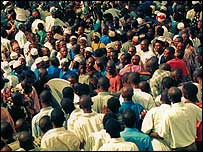|
By Sola Odunfa
BBC Focus on Africa magazine
|


The census dictates who really holds power
|
No-one knows how many Nigerians there are - and until now the authorities have been too afraid to find out.
Legend has it that one out of every five black people on Earth is a Nigerian. But that can only be an assumption, for every headcount held in Nigeria in the past 30 years has ended in national controversy and with strong allegations of population inflation.
The last census was carried out in 1991. Its figures - which are regarded only as being marginally less manipulated than the others - put the total population at 88.9 million, almost equally divided between the two sexes.
Since then the population has been projected on an annual growth rate of about
2.9%. The official projected figure for 2003 was 126 million.
Headcount
A new census was to have been held between November and December last
year. Preparations for it by the National Population Commission (NPC) started
in 2003.
But last July, President Olusegun Obasanjo delayed the exercise until this coming March.
The official reason given for the postponement was that vital material would not arrive from abroad in time for the headcount to be held as scheduled.
What was not openly acknowledged was the gathering political storm over the type of data to be collected.
The controversy relates to ethnicity and religion. How many Nigerians are
Muslims and how many are Christians? What is the strength of each ethnic group in the country?
Traditional and political leaders in the largely Muslim northern states announced last year their strong opposition to the inclusion of questions on religious persuasion and ethnicity in the census questionnaire.

The last census was carried out 14 years ago
|
They warned that they would mobilise people in the states against taking part in the census if the questions were included. But governors of states in the south-east responded with a counter warning - they would mobilise against the headcount in their states if the data to be collected did not include the numerical strengths of every
religious and ethnic group.
Amidst the growing furore, came the announcement from the NPC that it was abandoning the inclusion of the sensitive subjects - although it is not known whether it had made its decision before or after the heated arguments began.
Professor JG Ottong, a social scientist at the University of Calabar, explained that population has been a sensitive and controversial issue "because of its implications for shaping regional, state and ethnic relations and balance of power".
In the past, census figures were believed to have been manipulated for political advantage.
When Nigeria had three regions, the combined population of the two in the south was said to be less than that of the north. Therefore the north was - and still is - assured of absolute control of the federal government.
Funds
Southern leaders claimed at the time that election rigging began at the census level.
Their argument was that it ran against all known demographic principles for the largely semi-arid north to be more populated than the coastal south. And such deep-seated suspicion continues.
The mutual hostilities it engenders are thinly veiled. Each side is struggling for population and, therefore, political advantage.
The distribution of funds which accrue to the nation among the 36
component states is also based largely on population.
If a state is assigned a bloated populace, its draw from the national
purse is more than that of those with smaller populations.
This accounts for the sharp interest shown by state governors in how
the census is conducted.
In addition to the regional balancing of power on a population basis, there are also the ethnic and religious equations.
The Nigerian constitution stipulates that the "federal character" must be reflected in every government appointment.
This means that the relative strengths of every ethnic and religious group must be taken into consideration in determining appointments in the civil service, the armed forces and political institutions.
The "federal character" principle is a very touchy issue in Nigeria. Political and community leaders study the personnel composition of every institution of government with a microscope to find a breach of the principle where they are not favoured.
Christians across Nigeria refuse to accept past census conclusions that they are in a minority to Muslims.
On the other hand, Muslim leaders always point to the fact of their acknowledged numerical superiority to claim dominance in public institutions.


~RS~q~RS~~RS~z~RS~13~RS~)